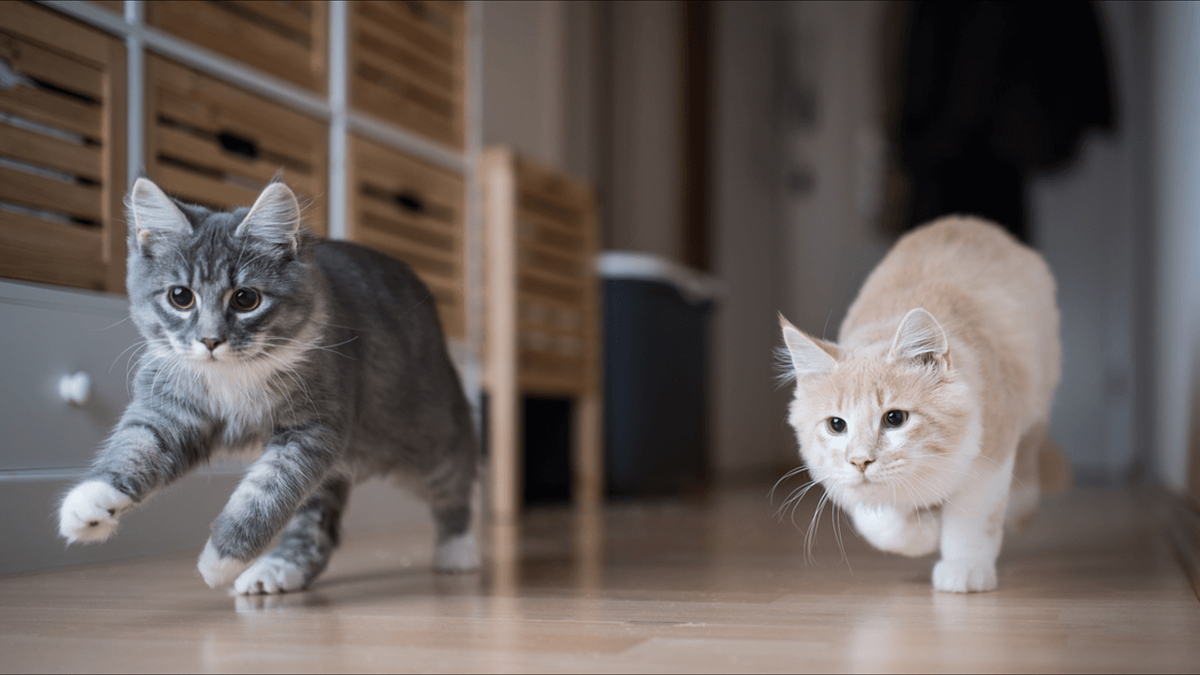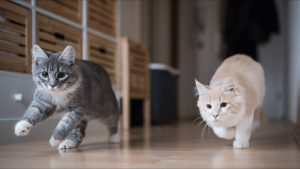A Cat’s Frantic Runs Around the House: Everything You Need to Know


Your cat’s objective is not to rouse you from your deep sleep at 3 a.m., despite how it may make you feel.
The “zoomies,” as they are known among cat parents, are a common occurrence. They’re sitting calmly one second, then the next they’re arguing. A moment later they’re sprinting across the house like they’re chasing after an impossibly faraway object.
Cats and dogs both exhibit the “zoomies” at some point, but dealing with a frantic pet, especially at night, may be difficult. All you need to know about cat zoomies and what causes them is here.
Cat Zoomies: What Are They?
You’ll know your cat has the zoomies by their frenetic running about the home, which goes by the name of the condition. When the zoomies are through, your cat is back to napping on the couch, just like that.
Pam Johnson-Bennett, CCBC, author and owner of Cat Behavior Associates, notes, “The zoomies generally seem as if a switch has turned.”
Zoomies may appear to a cat owner as though the cat has gone berserk for no apparent cause. In fact, it’s known as Frenetic Random Activity Periods (FRAPs). Your cat’s natural instinct is to gallop about the house whenever it feels like it’s bursting with energy.
Why Do Cats Get the ‘Zoozies’? ‘
These are the most frequent three, however there are more.
1. Excessive Effort
Pent-up energy is the most typical cause of a cat’s euphoria. Most of the day, cats sleep and relax in order to save energy for bursts of intense activity. Your kitten will find a method to expend its surplus energy if you don’t provide it with regular exercise and activities.
Ambush predators, Pam Johnson-Bennett of the CCBC explains, “conserve energy for many brief spurts when hunting.” “Zoomies may be a much-needed energy release for indoor cats who do not receive enough exercise.”
Pent-up energy can cause zoomies in cats of any age, although kittens and young cats may be more prone to the activity since they have more energy to expend.
Don’t forget to keep your cat active during the day. They won’t have to worry about knocking over vases or ripping up rugs to release their pent-up energy this way. In addition, you and your kitten will develop a close relationship as you play and engage in enrichment activities together.
2. Acute Pain
Even though this is a far less frequent cause of your cat’s zoomies, you should be aware of the signs so that you can take your cat to the doctor as soon as possible for treatment.
You could see your cat rushing about in an attempt to avoid the discomfort of fleas or irritated skin. Your cat’s eyesight and hearing may be deteriorating as they age, making them more susceptible to being startled and resulting in a frenzied dash around the home.
It’s difficult to tell if your cat is in discomfort or merely trying to burn off some steam. Be on the lookout for additional signs of discomfort, such as agitation, scratching, or licking excessive amounts. When a cat licks and zooms about a specific region, Johnson-Bennett believes it might be an indicator of discomfort or anxiety.
Even if your cat isn’t showing any obvious indications of pain, Bennett advises that if the zoomies persist despite frequent activity, it’s time to see the doctor.
3. The Post-Poop Zombies
After using the bathroom, some cats appear to do a victory lap around the house. Be on the lookout for indicators of constipation in your cat if he or she has the zoomies after eliminating in the litter box or exhibits any of the other symptoms of constipation. Checking up with your veterinarian even if your cat doesn’t clearly show these indicators is always a good idea, especially if the post-poop zoomies are a new behavior for your cat.
Keep your cat’s litter box clean if you can rule out intestinal concerns. Cats may experience the zoomies as a result of pooping in order to avoid an unpleasant odor. Cats can suffer from urinary tract infections and bacterial illnesses, therefore it’s important to keep the litter box clean.
What’s the matter? Cat Zombies at Night Can Be Prevented, Here’s How!
Cat parents all over the world are fully aware of this issue. Even though cats sleep for 15–20 hours a day, when you’re trying to get some shut-eye, they’re wide awake and eager to play! For those of you who have been plagued by late-night sprints by your cat, it’s time to find a solution.
If a cat often engages in the “zoomies,” Johnson-Bennett believes it is a sign that the cat needs to get more activity.
Regular playing between you and your cat will ensure that he or she gets the exercise he or she needs. When it comes to playing with your cat, Johnson-Bennett recommends at least two 15-minute bouts of interactive play every day.
Additionally, Johnson-Bennett stresses the need of providing cerebral activity and enjoyment; thus, play in a style that allows the cat to stalk and plot. To put it another way, “playing may be a form of cerebral exercise as well.”
Try out a few interactive toys that let cats play and get rewarded for their efforts if you want to assist exhaust your feline companion mentally. Your cat’s favorite interactive toy can help you get a good night’s sleep if you put it out before you go to bed.
Petstup is an official seller of the many well-known pets brands, focused on improving the lives of pets, pet parents and our partners. We proudly offer a large variety of pet nutrition products and supplies competitively priced for dogs, cats, reptiles, fish, birds and small animals. Petstup is your one stop shop for all your pet’s needs. All our products are authentic, and pass all mandatory United States standards and veterinary practices. We run several warehouses across the United States to serve you better and faster.




















